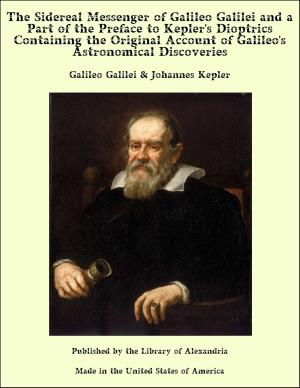A System of Logic: Ratiocinative and Inductive (Complete)
Nonfiction, Religion & Spirituality, New Age, History, Fiction & Literature| Author: | John Stuart Mill | ISBN: | 9781465544186 |
| Publisher: | Library of Alexandria | Publication: | March 8, 2015 |
| Imprint: | Language: | English |
| Author: | John Stuart Mill |
| ISBN: | 9781465544186 |
| Publisher: | Library of Alexandria |
| Publication: | March 8, 2015 |
| Imprint: | |
| Language: | English |
It is so much the established practice of writers on logic to commence their treatises by a few general observations (in most cases, it is true, rather meagre) on Terms and their varieties, that it will, perhaps, scarcely be required from me in merely following the common usage, to be as particular in assigning my reasons, as it is usually expected that those should be who deviate from it. The practice, indeed, is recommended by considerations far too obvious to require a formal justification. Logic is a portion of the Art of Thinking: Language is evidently, and by the admission of all philosophers, one of the principal instruments or helps of thought; and any imperfection in the instrument, or in the mode of employing it, is confessedly liable, still more than in almost any other art, to confuse and impede the process, and destroy all ground of confidence in the result. For a mind not previously versed in the meaning and right use of the various kinds of words, to attempt the study of methods of philosophizing, would be as if some one should attempt to become an astronomical observer, having never learned to adjust the focal distance of his optical instruments so as to see distinctly. Since Reasoning, or Inference, the principal subject of logic, is an operation which usually takes place by means of words, and in complicated cases can take place in no other way; those who have not a thorough insight into the signification and purposes of words, will be under chances, amounting almost to certainty, of reasoning or inferring incorrectly. And logicians have generally felt that unless, in the very first stage, they removed this source of error; unless they taught thei pupil to put away the glasses which distort the object, and to use those which are adapted to his purpose in such a manner as to assist, not perplex, his vision; he would not be in a condition to practise the remaining part of their discipline with any prospect of advantage. Therefore it is that an inquiry into language, so far as is needful to guard against the errors to which it gives rise, has at all times been deemed a necessary preliminary to the study of logic. But there is another reason, of a still more fundamental nature, why the import of words should be the earliest subject of the logician’s consideration: because without it he cannot examine into the import of Propositions. Now this is a subject which stands on the very threshold of the science of logic. The object of logic, as defined in the Introductory Chapter, is to ascertain how we come by that portion of our knowledge (much the greatest portion) which is not intuitive: and by what criterion we can, in matters not self-evident, distinguish between things proved and things not proved, between what is worthy and what is unworthy of belief. Of the various questions which present themselves to our inquiring faculties, some receive an answer from direct consciousness, others, if resolved at all, can only be resolved by means of evidence. Logic is concerned with these last. But before inquiring into the mode of resolving questions, it is necessary to inquire what are those which offer themselves; what questions are conceivable; what inquiries are there, to which mankind have either obtained, or been able to imagine it possible that they should obtain, an answer. This point is best ascertained by a survey and analysis of Propositions.
It is so much the established practice of writers on logic to commence their treatises by a few general observations (in most cases, it is true, rather meagre) on Terms and their varieties, that it will, perhaps, scarcely be required from me in merely following the common usage, to be as particular in assigning my reasons, as it is usually expected that those should be who deviate from it. The practice, indeed, is recommended by considerations far too obvious to require a formal justification. Logic is a portion of the Art of Thinking: Language is evidently, and by the admission of all philosophers, one of the principal instruments or helps of thought; and any imperfection in the instrument, or in the mode of employing it, is confessedly liable, still more than in almost any other art, to confuse and impede the process, and destroy all ground of confidence in the result. For a mind not previously versed in the meaning and right use of the various kinds of words, to attempt the study of methods of philosophizing, would be as if some one should attempt to become an astronomical observer, having never learned to adjust the focal distance of his optical instruments so as to see distinctly. Since Reasoning, or Inference, the principal subject of logic, is an operation which usually takes place by means of words, and in complicated cases can take place in no other way; those who have not a thorough insight into the signification and purposes of words, will be under chances, amounting almost to certainty, of reasoning or inferring incorrectly. And logicians have generally felt that unless, in the very first stage, they removed this source of error; unless they taught thei pupil to put away the glasses which distort the object, and to use those which are adapted to his purpose in such a manner as to assist, not perplex, his vision; he would not be in a condition to practise the remaining part of their discipline with any prospect of advantage. Therefore it is that an inquiry into language, so far as is needful to guard against the errors to which it gives rise, has at all times been deemed a necessary preliminary to the study of logic. But there is another reason, of a still more fundamental nature, why the import of words should be the earliest subject of the logician’s consideration: because without it he cannot examine into the import of Propositions. Now this is a subject which stands on the very threshold of the science of logic. The object of logic, as defined in the Introductory Chapter, is to ascertain how we come by that portion of our knowledge (much the greatest portion) which is not intuitive: and by what criterion we can, in matters not self-evident, distinguish between things proved and things not proved, between what is worthy and what is unworthy of belief. Of the various questions which present themselves to our inquiring faculties, some receive an answer from direct consciousness, others, if resolved at all, can only be resolved by means of evidence. Logic is concerned with these last. But before inquiring into the mode of resolving questions, it is necessary to inquire what are those which offer themselves; what questions are conceivable; what inquiries are there, to which mankind have either obtained, or been able to imagine it possible that they should obtain, an answer. This point is best ascertained by a survey and analysis of Propositions.















